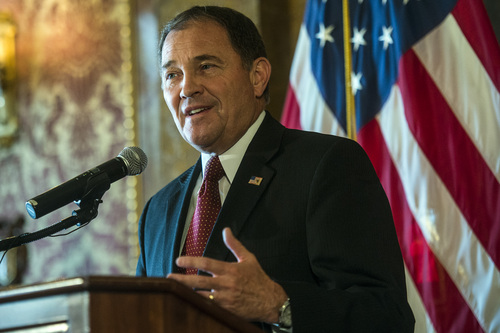This is an archived article that was published on sltrib.com in 2014, and information in the article may be outdated. It is provided only for personal research purposes and may not be reprinted.
Utah will take its same-sex marriage fight all the way to the U.S. Supreme Court, Gov. Gary Herbert vowed Wednesday, steadfast in his belief in the right of states to define marriage.
"People on all sides of the issue will want to get this to the Supreme Court as soon as possible to get some finality," he said at an afternoon news conference. "It's like stopping a game in the middle of the contest. This was a 2-1 decision. ...You can't stop in the middle. You've got to play to the final buzzer."
Utah's case has been a precedent setter.
It was the first nationally in which a federal judge struck down a state's same-sex marriage ban, clearing the way for federal court rulings in other states. Wednesday's 10th Circuit Court of Appeals decision was the first time an appeals court has ruled on the issue, since the Supreme Court struck down parts of the U.S. Defense of Marriage Act a year ago.
The appellate court declared voter-approved gay marriage prohibitions to be in violation of couples' constitutional rights to equal protection and due process.
"We hold that the Fourteenth Amendment protects the fundamental right to marry, establish a family, raise children, and enjoy the full protection of a state's marital laws. A state may not deny the issuance of a marriage license to two persons, or refuse to recognize their marriage, based solely upon the sex of the persons in the marriage union," the court said.
The 10th Circuit clearly wants the Supreme Court to weigh in; it put an immediate stay on the decision pending a decision from the highest court.
But experts differ on the likelihood of the Supreme Court picking Utah to settle a legal debate bubbling in more than half the nation's states. Thirty states have constitutional or statutory gay marriage bans under challenge in the courts.
The attorney general's office said it will petition the nation's highest court for a decision, and has 90 days to do so. It has not decided whether to take the intermediary step of asking the 10th Circuit Court for an en banc [full court] review.
If the 10th Circuit agreed to re-hear the case, which some say is unlikely given the comprehensiveness of Wednesday's ruling, Utah could prevail.
With the make-up of the court, "there's a chance they could win before an en banc of the 10th Circuit," said Carl Tobias, a law professor at the University of Richmond who has been tracking gay marriage decisions. "It would be close."
But equally pivotal is whether the high court has reason to take up the issue. It typically looks for opportunities to reconcile conflicting lower court opinions and, since the Windsor challenge to the Defense of Marriage Act,every district court has ruled against same-sex marriage bans.
"I think justices will want to wait for a couple of [appeals] court decisions and see whether there's a split," Tobias said.
University of Utah law professor Clifford Rosky, chairman of Equality Utah's board, said, "technically speaking the circuits are split." In 2006 the 8th Circuit upheld Nebraska's same-sex marriage ban.
But he admits that was before the Windsor case, making it "ancient history."
A decision from a reportedly sharply divided 4th Circuit Court on Virginia's same-sex marriage ban is expected soon. The case was argued on May 13. The 6th Circuit Court is also scheduled to hear a similar case in early August.
Calculating its odds at losing or prevailing, Utah could decide to wait to file its Petition for Writ of Certiorari to the United States Supreme Court.
But it's a legal strategy that could cut both ways.
"Composition of the court could change in a while, but it's hard to say how it could change," said Will Baude, a former clerk to Chief Justice John Roberts who teaches law at the University of Chicago.
Baude, a constitutional law expert, is more inclined to think the Supreme Court will weigh in without waiting for division from lower courts. The court could agree to take the case as soon as this fall and rule by this time next year.
They tackled the Windsor challenge "and there was no split there," Baude said. "They also heard arguments on California's Prop 8, though on procedural grounds."



